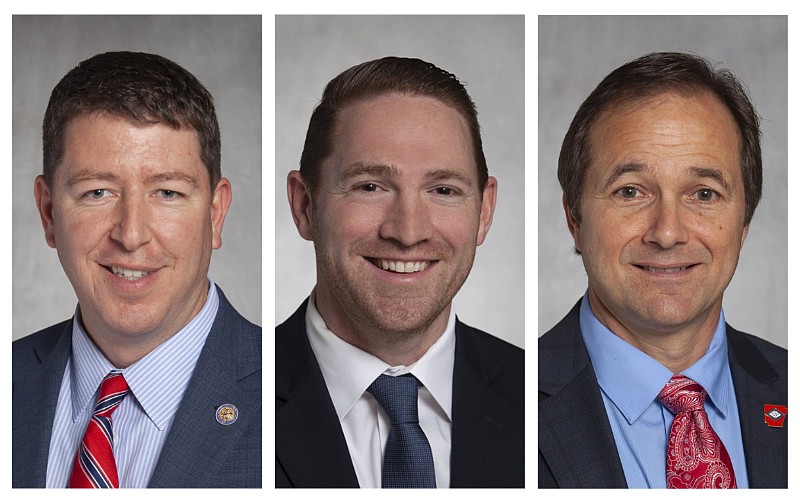Voters picked Northwest Arkansas’ largest-ever legislative delegation Tuesday, and incoming members said they expect the “corner caucus” to have greater influence at the Capitol.
“We’re going to have 13 new senators,” said Sen. Bart Hester, R-Cave Springs, of the 35-member state Senate. The Senate chose Hester on Thursday as incoming president of that chamber.
The turnover in membership means the body will change and with it, state policy, Hester said. The larger Northwest Arkansas delegation will help shape that policy, he said.
Sen.-elect Joshua Bryant, R-Rogers, agreed. Bryant is a state House member from Rogers who successfully ran for the Senate this year. Incoming lawmakers from Northwest Arkansas will want to focus on preparing the region for the expected 1-million population in 2045, he said.
“If we do what we know is good for expansion in the Northwest, that will help the rest of the state,” Bryant said. That would mean legislators concentrating on issues like infrastructure needs such as water supplies and wastewater treatment and streamlining state regulations.
Arkansans who live in the region want to manage their own local affairs as much as possible, Hester said.
“When most senators from other places get a call from constituents, the caller’s asking for something from government,” Hester said. “When I get a call, the caller’s asking that the government leave them alone in some way.” Objection to government intervention, particularly the closings of schools and churches during the height of the covid pandemic, was largely the reason he ran and why his voters supported him, said Sen.-Elect Tyler Dees, R-Siloam Springs, another incoming freshman. Voters saw overreach into vital local and cultural matters, he said.
Growing Benton and Washington counties between them gained a new state Senate seat and four House seats from the red raw i n g of l e g i s l at ive boundaries last year. Those gains represent population growth in the region. They also reflect population decline in other parts of the state.
Eighteen of the 100 members of the state House to be sworn in in January will live in either Benton or Washington county, election results show.
Senate staff confirmed Wednesday the Senate in 2023 will boast the largest freshman class since 2003, which had 14 new members that year. In 2003, the then-harsher state term limits amendment fully kicked in. The limit of two terms after the amendment passed forced the retirement of much of the Senate in the 2000 and 2002 elections.
This year, a combination of factors, including an ongoing shift in the state’s population, contributed to the large freshman class.
For instance, Senate District 34 in Benton County looked completely different and had no incumbent when district lines were redrawn after the 2020 U.S. Census.
The biggest batch of freshman senators comes from Northwest Arkansas and the River Valley, all along the Interstate 49 corridor, election results show. Six of the 13 new senators come from the corridor. Four are current House members who ran for Senate seats: State Reps. Bryant; Jim Dotson, R-Bentonville; Clint Penzo, R-Springdale and Justin Boyd, R-Fort Smith. Two are true freshmen legislators: Van Buren City Council member Jim Petty and, in his first elected office, Dees.
There is something constituents from the Northwest Arkansas region don’t want, Hester said.
“They want the Legislature to not make the national news,” he said.
“We’re unique in that we have the headquarters of several Fortune 500 companies in our region,” Hester said.
“When people outside the state go to Google and search for Northwest Arkansas, we want them to see stories about bike trails, safe streets and good jobs, not something the Legislature did.” The “corner caucus” also includes four of the Legislature’s remaining Democrats. Six Democrats will serve in the Senate this legislative session, election results show.
One is Sen. Greg Leding of Fayetteville. Seventeen Democrats will serve in the House. Three of those come from Fayetteville. Another will come from Fort Smith.
Partisan divides will not bar cooperation on most legislative issues regarding the region’s interests, said both Hester and Leding.
“The Grand Canyon lies between Greg Leding and me politically, but we had lunch together,” Hester said while the Senate held a pre-session meeting in Little Rock on Wednesday.
Eve r y l aw m a ke r i n Northwest Arkansas wants to see the University of Arkansas, Fayetteville thrive, Leding said. Every part of the region is affected by the university, by Northwest Arkansas National Airport,
Today’s radar speed checks
Little Rock police and the Pulaski County sheriff’s office will use radar to detect speeding at these locations. Police and sheriff’s deputies may conduct radar checks in other locations as well.
Little Rock: 2100 Fair Park Blvd.
Pulaski County: Faulkner Lake Rd.
Northwest Arkansas Community College, growth issues and other matters of common interest, Leding said.
On other issues, Leding advised Democratic members — and Republicans too — to not draw partisan lines.
“You never know where you can get help from,” he said. “Never assume anyone’s position on anything.”

